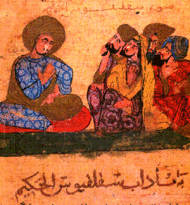Template:Pictorial-Islam-options: Difference between revisions
| [checked revision] | [checked revision] |
mNo edit summary |
mNo edit summary |
||
| Line 1: | Line 1: | ||
<noinclude>Also see: [[Template:Pictorial-Islam]]</noinclude><!-- HELP NOTES: Each option tag handles one random story --><choose> | <noinclude>Also see: [[Template:Pictorial-Islam]]</noinclude><!-- HELP NOTES: Each option tag handles one random story --><choose> | ||
<option weight="1">{{Pictorial-Islam|1=Qur'anic Claim of Everything Created in Pairs|2=[[File:B-rotifers-organism.jpg|185px|link=Quranic Claim of Everything Created in Pairs]]|3=This article analyzes the claim that Man did not know anything about the "creation in pairs" at the time of the 'descent' of the Qur'an. The case against the Qur'an is really very simple. All one has to do is to show that not all creatures are ‘created’ in pairs. | |||
Based on the existence of the schizophyllum commune, and asexual, hermaphroditic and parthenogenetic organisms, the Qur'anic verses about Allah creating all creatures in pairs (male and female) are shown to be in error. | |||
The ancient Chinese Yin-Yang duality principle proves that the spurious claim of ‘creation in pairs’ to mean matter-antimatter complements to be unremarkable. Besides, some Hindus make similar claims about the Rig-Veda as the Muslims make about the Qur'an and scriptural allusions to matter and antimatter. ([[Quranic Claim of Everything Created in Pairs|''read more'']])}}</option> | |||
Revision as of 22:13, 31 January 2014
Also see: Template:Pictorial-Islam
|
